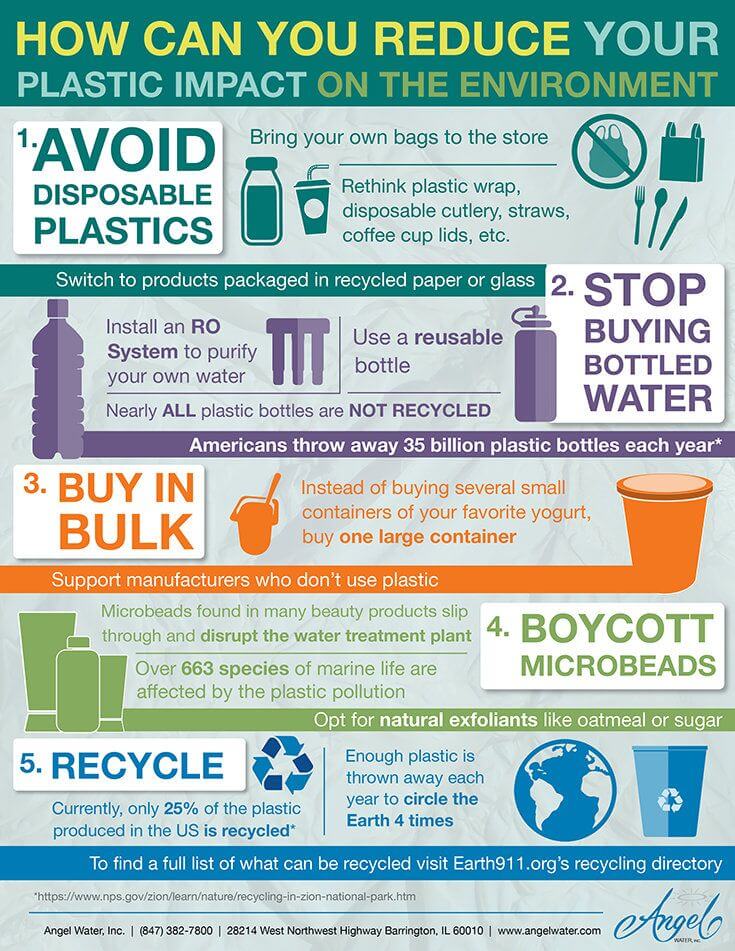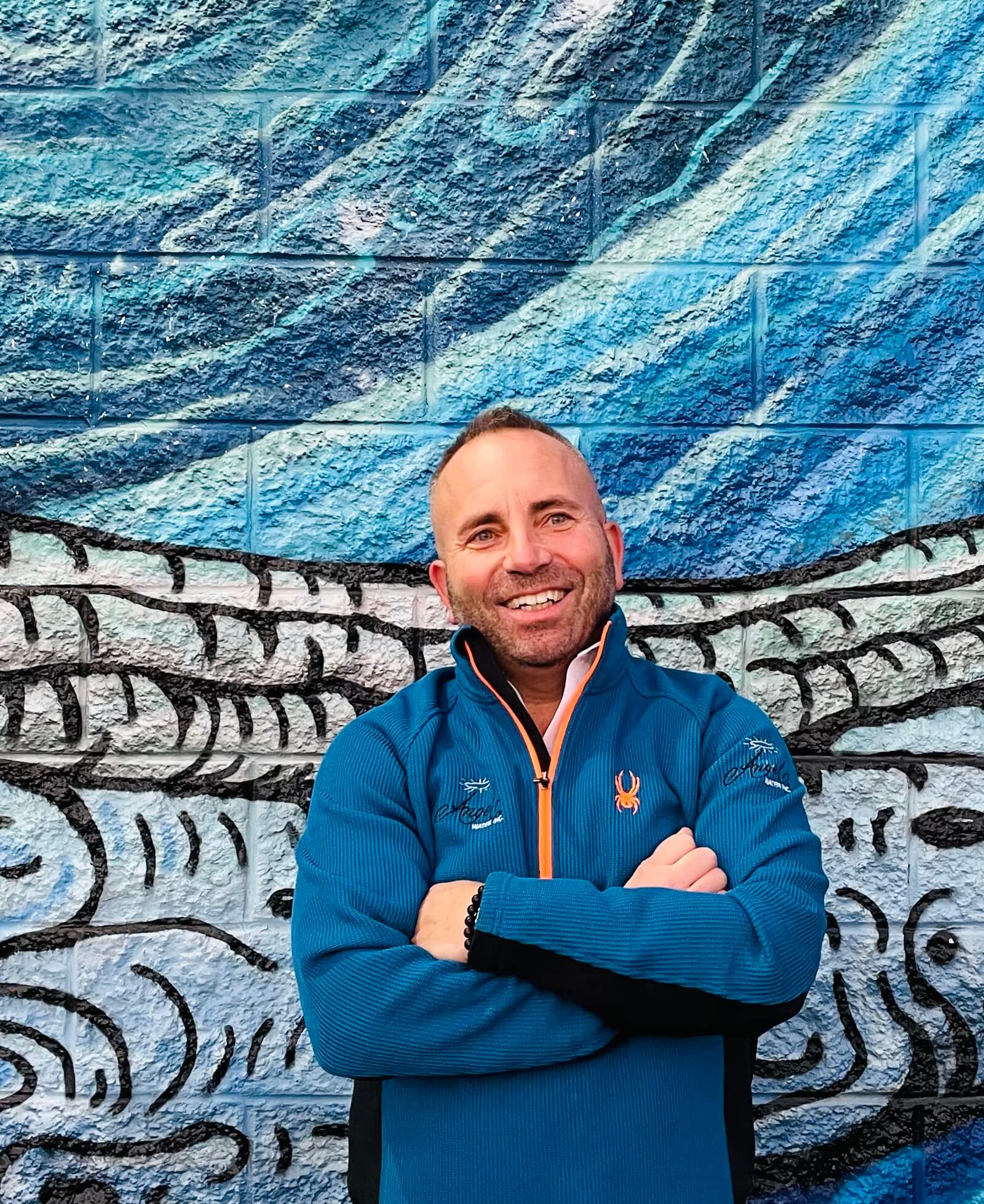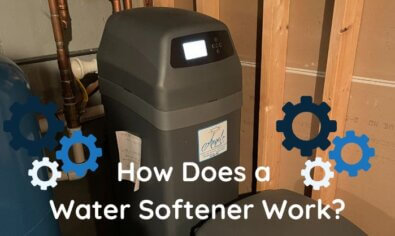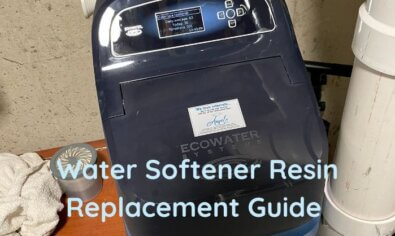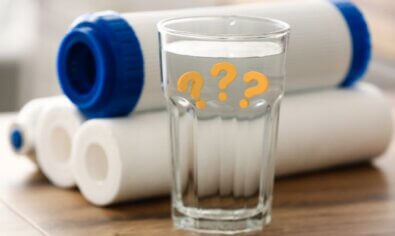How to Reduce Plastic Waste: Drinking Water Systems and More
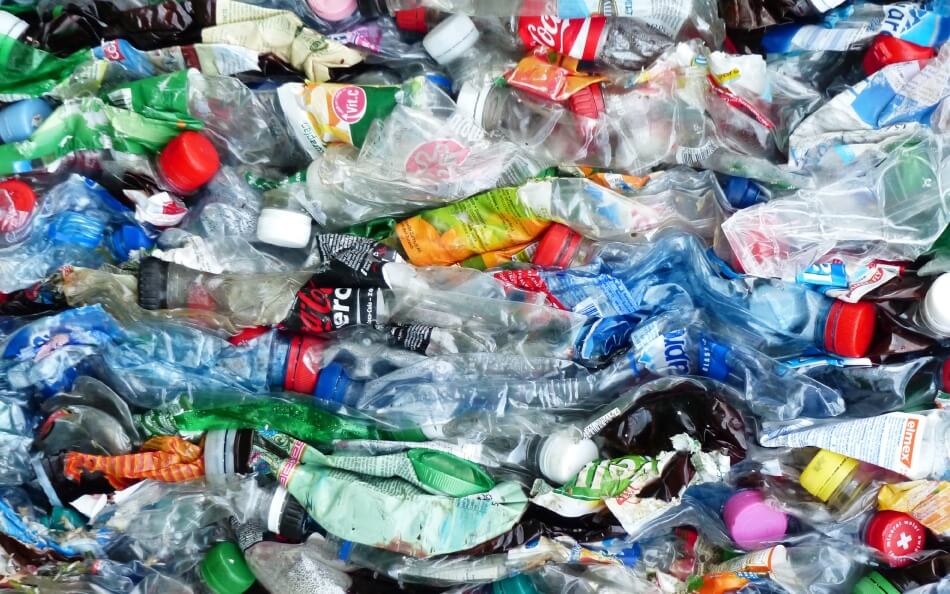
One Big Problem—Five Big Ways You Can Fight It
It used to be that if you had to throw something away right after you open it, that meant this was something of low quality and poor craftsmanship, and you should save for 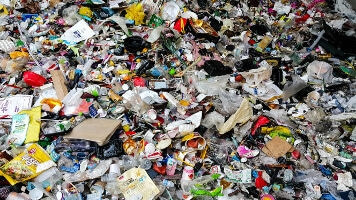 something better. But these days, disposable is the norm, thanks to one big invention: plastic.
something better. But these days, disposable is the norm, thanks to one big invention: plastic.
The average American now discards half of all plastic after only one use, and throws away a total of 185 pounds of plastic per year. And for the most part, it’ll never be used for anything again: of the only 6.5% of plastic is recycled, and 7.7% is burned to generate electricity, leaving 85.8% of all discarded plastic to make its way into the environment.
Throwing away all that plastic every day takes a big toll on our society and our planet as a whole. Let’s take a look at this impact—and then a few ways to counteract that impact, including drinking water systems and beach cleanups.
The Impact of Plastic
The volume of plastic waste that we produce is staggering.
We create 33.6 million tons of plastic waste every year. Ten metric tons of plastic fragments from products like bags, bottles, and straws flow into the Pacific Ocean every day out of the Los Angeles area alone.
As a result, billions of pounds of plastic now float in swirling convergences taking up 40% of the Earth’s ocean surface area. The Great Pacific Garbage Patch, for example, is the largest garbage site in the world: it’s twice the size of Texas and floats in the North Pacific Gyre off the coast of California. Of that trash, 90% is plastic.
This has a profound impact on the environment.
Plastic kills millions of birds and fish every year through entanglement and ingestion, as well as about 100,000 marine mammals and many coral.
Plastic continually breaks down into ever-smaller particles, but is never converted into anything else. On top of that, a lot of plastic floats. What this means is that over time, a single plastic bottle will eventually decompose into innumerable microscopic plastic beads and can end up strewn across every beach in the world. This makes the plastic become invisible and impossible to remove.
As the particles get smaller, they can get eaten by smaller and smaller creatures, finding more entry points into the food chain. In the end, plastic has been found in the systems of many of the fish you eat, having gotten there both directly and in the smaller organisms they eat.
This is especially worrisome because these tiny plastic pellets, or “nurdles” as they’re called, act as toxic sponges. This means that as they travel through water, they attract all sorts of other pollutants that cling to them. Then, this whole package is what gets eaten by various organisms, which we then may eat ourselves.
And because the chemicals in plastic can get metabolized and stick around for a long time, our overuse of plastic affects our own health too. In Americans aged 6 and over, 93% test positive for Bisphenol A (BPA), a chemical used in the creation of plastics that is linked by researchers to negative effects to the endocrine system, the part of the nervous system that governs long-term processes like brain development. This most often comes from using these plastics to store or heat food.
So, clearly we need to start using less plastic. But how do we do it? Here are a few suggestions on how you can start!
1. Use Reusable Bags and Containers
Plastic bags rip easy and aren’t all that useful, and yet anywhere from five billion to one  trillion of them are used every year globally. These bags are particularly bad because of how easily they’re carried and spread by wind, and how they can entangle and suffocate wildlife.
trillion of them are used every year globally. These bags are particularly bad because of how easily they’re carried and spread by wind, and how they can entangle and suffocate wildlife.
Angel Water Now Offers Free Water Tests!
Don’t Guess, Test! Get Your Free Water Test Now and Take Control of Your Water Quality.
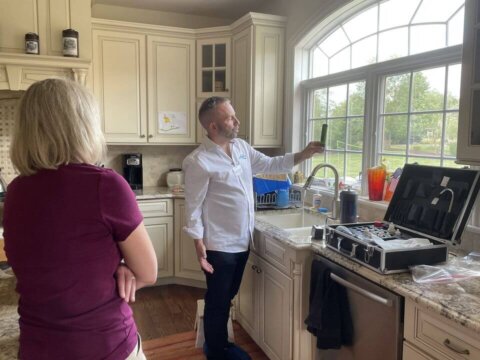
To reduce your part in this, you can replace them with reusable canvas bags, and maybe even bring some smaller ones to replace produce bags.
The same goes for containers of all sorts. Rather than bringing bottled drinks for lunch, use a thermos. Instead of eating frozen food from disposable packaging, try to cook more often. Don’t buy coffee in foam cups; bring your own mug. Even plastic straws can be replaced with reusable ones made from steel or glass.
2. Try Green Cleaning
One way to vastly cut down on the amount of plastic bottles and containers you use, and save space and money while you’re at it, is to try out “green cleaning”. This is when you replace your many cleaning products, specialized for tiles, tubs, and toilet bowls, with simple homemade alternatives made from common ingredients like baking soda and vinegar. Fewer bottles, less waste!
3. Join Others for Beach Cleanups
Much of the plastic we use ends up in the oceans. A lot of it stays there, but a lot of it ends up washing up on beaches as well. In fact, there likely isn’t a single stretch of beach in the world that doesn’t have at least some plastic waste.
The most direct way to combat this waste is to go out and help remove it. The Surfrider Foundation has chapters all around the coastal US, as well as around Lake Michigan and on the Mississippi River. They’re the “boots on the ground” in the fight against plastic waste, and volunteering with them is a great way to get involved in reversing plastic pollution.
4. Advocacy and Policy
You alone can only do so much, but policy can make large-scale changes. The biggest way you can make a change that actually impacts the problem is to help legislation get passed.
Many cities across the country have bans on plastic foam packaging, while others have bans or usage fees specifically for plastic bags. These and other measures are important steps in curbing society-wide usage of plastic. Joining local efforts organizing around such policies can be a good way to get at the problem on a larger scale.
5. Drinking Water Systems Over Bottled Water
If you’ve ever heard about the problem of plastic waste, you’ve probably heard about the role that bottled water plays. If you don’t have a drinking water system installed at your home or workplace, you probably rely on water bought in plastic bottles.
About 200 billion water bottles are made annually worldwide, and in the US alone we use 2 million every 5 minutes. As a result, two million tons of plastic water bottles now sits in our landfills. That’s aside from all the bottles out in the ocean that we’ve discussed.
Drinking water systems are an ideal alternative. Not only do drinking water systems eliminate the plastic waste, but drinking water systems also provide cleaner and healthier water at a fraction of the cost of bottled water.
If you’re ready to kick bottled water and reduce the impact of your plastic usage, then you’ll need an expert to help you choose the system best suited for your families needs!
No Fields Found.
Simply fill out the form above or call (847) 382-7800 to schedule your installation today and you could be resting easy by tomorrow!
Remember, the trusted professionals at Angel Water have been installing and servicing drinking water systems in Barrington, IL and the rest of the Chicago area for decades, as well as providing many other water treatment services such as water testing. Our technicians are highly trained and have years of hands-on experience, and our systems are NSF-certified to provide you safe, desirable water.
Interested in a Water Softener System for Your Home?
You don’t have to live with a dry, itchy scalp and brittle hair anymore! It would be our pleasure to help you find the right water softener to make your showers enjoyable again.
Please give us a call at (847) 382-7800 or visit our water softener page to learn more.
